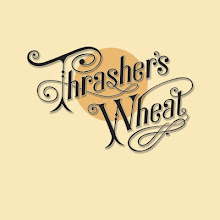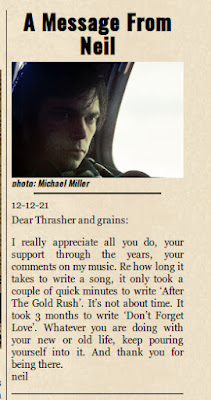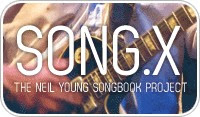Yet Another Attempt To Explain The “Difficult” Neil Young Records | Vinyl Me, Please
If so (and we know we have all been there before) then here's just the trick -- the handy guide: An Attempt To Explain The “Difficult” Neil Young Records from Vinyl Me, Please by JR Moores.
From 2018, here's the chapter on soundtracks by Neil Young, including the Where The Buffalo Roam gonzo film on Hunter S. Thompson:
Ever one for confounding his audience’s expectations, Young followed his 1972 smash hit Harvest with the movie
Journey Through The Past. It’s an experimental documentary that patches together backstage footage, live performances, television appearances, news footage and other strange clips into an abstract retrospective of Young’s career. Featuring performances by Buffalo Springfield, Crosby, Stills, Nash & Young and notable solo cuts including a rambling 16-minute rendition of Harvest’s “Words”, it also includes weird non-Young cuts such as The Tony & Susan Alamo Christian Foundation & Chorus performing part of Handel’s Messiah and a random Beach Boys instrumental, neither of which were excluded from the vinyl soundtrack release. Rolling Stone called the record “a depressing combination of sloppy music and verbal filler” and declared it “the nadir of Neil Young’s recording activity.” It was never released on CD.
Young’s next foray into the world of the soundtrack was an even scrappier affair. He provided the incidental music toWhere The Buffalo Roam, the 1980 flick in which Bill Murray played the gun-totin’, drug-poppin’ gonzo author Hunter S. Thompson. Its soundtrack features classic tracks by Hendrix, Dylan and others but, in true gonzo spirit, Young’s seven contributions add up to less than 10 minutes of music and mainly consist of him playing creaky variations of “Home On The Range.”
Young’s film-score masterpiece would come fifteen years later with his collection of music from “and inspired by” Jim Jarmusch’sDead Man. The album includes snippets of the film’s dialogue and its star, Johnny Depp, reading extracts of William Blake’s poetry. But Young is the true star of this disc, having improvised the music alone, using mainly his electric guitar, with occasional passages performed on acoustic guitar, pump organ or detuned piano. While unquestionably among Young’s weirdest ever moments, Dead Man is also one of his finest idiosyncratic achievements, on which he crafted a distinctly eerie atmosphere that invites parallels to ambient music, post-rock and the melancholic drone metal of groups such as Earth, yet all the while remaining definitively, unmistakably Neil.
Or as others have noted previously, maybe Neil just runs about 30 years ahead of us and it takes awhile for his audience to catch up?
The article concludes with this speculation where anything is possible with Neil and his muse:
So what manner of weirdness might Young embark on next?
Personally, I’m holding out for a semi-live, multi-disc concept album recorded in the back of a green-fuel animal rescue truck with the Sun-Ra Arkestra who’ve been instructed to perform “cyber-skiffle” without any rehearsal, produced by the guy from The War On Drugs. Stranger things have happened. Wherever Young does go next, here’s hoping there’s plenty more life in the weird dog yet.
“cyber-skiffle” ??!! Whatever that is sounds cool.
More albums explained on An Attempt To Explain The “Difficult” Neil Young Records from Vinyl Me, Please.
Labels: albums, neil young
































 Human Highway
Human Highway

















 Concert Review of the Moment
Concert Review of the Moment





 This Land is My Land
This Land is My Land

 FREEDOM In A New Year
FREEDOM In A New Year









 *Thanks Neil!*
*Thanks Neil!*




![[EFC Blue Ribbon - Free Speech Online]](http://www.thrasherswheat.org/gifs/free-speech.gif)











 The Unbearable Lightness of Being Neil Young
The Unbearable Lightness of Being Neil Young Pardon My Heart
Pardon My Heart



 "We're The Ones
"We're The Ones  Thanks for Supporting Thrasher's Wheat!
Thanks for Supporting Thrasher's Wheat!




 This blog
This blog 
 (... he didn't kill himself either...)
#AaronDidntKillHimself
(... he didn't kill himself either...)
#AaronDidntKillHimself









































































 Neil Young's Moon Songs
Neil Young's Moon Songs




 Civic Duty Is Not Terrorism
Civic Duty Is Not Terrorism Orwell (and Grandpa) Was Right
Orwell (and Grandpa) Was Right


 What's So Funny About
What's So Funny About 



10 Comments:
From the TW Wayback Machine, here's what Meta Rocker Ian had to say on the subject of “Difficult Neil":
Trans, I think it's one of Neil's strongest albums of the '80s.
And simultaneously one of his most flawed. From what I've read, the final product is really parts of two albums smashed together. The three "regular" (non-vocoder) songs were dropped in from a previous album rejected by Geffin. I'd have liked an entire, complete concept album of the electronica stuff, although Like an Inca is obviously a classic with its connections to Neil's other epic, Hitchhiker, which carried an almost mythical status for decades until it was finally recorded on Le Noise (2010). As it is, Trans to me feels like great piece of work with perhaps a few pieces missing or incomplete. Neil has said as much, too, possibly in Shakey (the bio Neil fans sometimes treat as a Bible of sorts).
I guess the important thing with all of these "unusual" albums is to try something new. Sometimes it works and sometimes it doesn't. Sometimes you don't really know if it worked until 20 or 30 years later. When you choose a path (as Neil has) based on intrepid experimentation and the relentless pursuit of fresh ideas, you're likely to hit a few bumps (or forks) in the road.
But I also think it's worth the risk to try to new stuff. As the truism goes,you never know until you try. You can repeat what you know you're capable of over and over again, but where's the value in that? Sure, it's cool that you can do it with one hand tied behind your back, but the goal shouldn't be to show off--or constantly repackage the greatest hits. Plus, it's very subjective: what works for one person might fail miserably for someone else. Using that logic, one can hope there's something for everyone in Neil's vast body of work. But I'm not holding my breath. Some people don't get Neil. And some people don't get Dylan--I was one of those for quite a while.
So, live and let live. And keep creating.
***
http://neilyoungnews.thrasherswheat.org/2016/09/an-attempt-to-explain-difficult-neil.html#c7504262328011808754
Thanks for the shout-out, Thrasher. This topic makes me wonder if it isn't time to check out Paradox--both the soundtrack and the movie--again soon. For what it's worth, I thought the movie was a good trip at the time.
The other salient point, of course, is that one listener's "difficult" album could be another's fond favorite. Hell, some albums can be more or less difficult for me to listen to depending on my mood at any given time. So I hesitate to neatly categorize NY's (or anyone's work) into hits and misses, or accessible vs. obscure. So many variables at play.
One thing hasn't changed since I wrote the quoted comment: NY and his friends are still creating new (yet familiar) musical sounds. It's funny to look back at that post, and realize that I wrote it in 2016, before innovative clarion call that is (for my ears) The Visitor. If anything, the music in the last several years strengthens my conviction it's all about growth.
you bet Ian. Our pleasure.
"If anything, the music in the last several years strengthens my conviction it's all about growth."
yes, exactly.
and funny how we can pull posts and comments from years ago and they still hold.
This comment has been removed by the author.
@ wsanjose01 & @ jonathan - ok, need to step in here.
so, one's person's "long winded pontificating over thinking" is another person's cake, ok?
if you have a problem with that, as we've debated w/ jonathan for literally over a decade, then post something of worth and consequence. Don't belittle, trivialize, act all juvenile about it.
this is naive, duplicitous, and disingenuous to come on here and take pot shots at comments.
It is recognized for what it is,. sowing dissension as part of dived and conquer. we've been thru this and it is apparent to all without eyes wide shut.
you win folks over with persuasive, logical, fact driven, compelling arguments that resonate.
not by being a jerk w/ ad hominen attacks, trollish behavior, boorish comments and snipes. you're not convincing anyone of anything with this attitude. read that again, ok
this isn't about free speech. this about how to conduct oneself in a debate.
to be extremely clear, one of our dearest commenters Dan has left the building b/c of bad blood here. and that's a loss to our community, plain & simple.
and now who would want to drive away regular positive commentary now?
while Dan may not be your cup of tea, than post your world view. This is one of the last open forums on the internet. destroy this forum and poof. TW is 2nd the longest running website on the net going on 27 years now.
think about that. you can be part of history ... or not.
yes, we are a free speech absolutist. The 1st amendment includes hate speech. sorry.
however, we run this blog just like your local papers Letters to the Editor. we have a duty and obligation to not violate our community stds. If it violates community standards, then sorry.
And what are our community standards? well, right there linked into every comment box, is the TW Comments Policy. As you can see, we've given this years of contemplation and consideration and do not take any of this lightly.
btw, have you noticed that the world is having an infodemic war?
Now that neil has a LTE section, we try and run TW in the same spirit allowing all sorts of view points.
But please, do not attack commenters here who are jut stating their opinions about music. It's not like Dan is spouting off some off the wall political opinions or something.
we've said b4 and say it again. what goes on here in these comments is noticed. not just by neil & crew but the music and publishing industry as well. laugh all you want but we do get calls quite often from folks that might surprise you.
"But we need you now, and that's why I'm hangin' 'round.
So you be good to me and I'll be good to you,
And in this land of conditions I'm not above suspicion
I won't attack you, but I won't back you."
peace brothers wsanjose01 & jonathan
Back to Ian's point and Thrasher's initial post. How our moods/feelings/emotions or thoughts interact with the actual quality of the music is important- we need to remember it frequently goes the other way- the music brings to us the mood. You already know that. But it might be that the mood that is evoked and that any mood is substantially evoked might be a signal of the real authentic quality of the music. In other words, it has to be noticed, it might even have to be recognized and felt by someone who truly listens. I agree with Ian on The Visitor (which I keep mistakenly call The Listener), it is deeply evocative. I was reading Tim O'Brien's "The Things They Carried" yesterday while my wife was in surgery (all ok) and because I was distracted it did not slap me in the face with its urgency and desperation. Later that evening, it just destroyed me, as the real content evoked thoughts, moods, emotions, and so forth of a certain sort.
Long winded. I suppose anything that makes an effort at understanding will be long winded. Better than nasty little sound bites aimed at harming and antagonizing. I am happy to remain a "pseudo-intellectual" to those who say so- it means absolutely nothing to me. I have friends and colleagues who know me, read my essays, and who understand what I am trying to do. In order to feel the sting of an insult one must somehow buy into it or care. I don't buy into it and I don't care.
Thrasher, thanks for you last long post. Great stuff as always.
This comment has been removed by the author.
@Ian, here is what seems to be a genuine criterion for musical quality. What is "evoked" in the real listener is a cluster of related mental states (emotions, feelings, thoughts, etc), which given the context of the song, become increasingly more powerful as they are grasped. The song "On the Beach" has such a result. Desperation is not cheaply evoked but consists in the subtle interplay of lyrics and music- where one small change could disrupt the whole. (This might be where we see the conditions for growth, building on what has come before with small changes, think "Welcome Back.") I always go back to ecology for the fundamental aesthetic concepts. There are so many cheap evocations of emotion in popular culture that it might be reasonable to conclude that we have damaged our ability for authentic emotion.
Perhaps way more important- there was no "intent" to evoke such and such emotions, which is a signal of the authentic. The artist is not thinking of how to bring about anything.
@Abner, Thanks--it took me a few days to notice the responses here!
I agree, what we are trying, perhaps vainly, to quantify or pin down is a triangulation of sorts between musician, music, and listener. Or author, text, and audience.
Reader Response Theory (speaking broadly) is the literary equivalent. Critics agree on the basic premise, but of course differ on precisely what each party brings to the triangle.
The impact is (partly) in the ear of the beholder, so to speak.
Post a Comment
<< Home